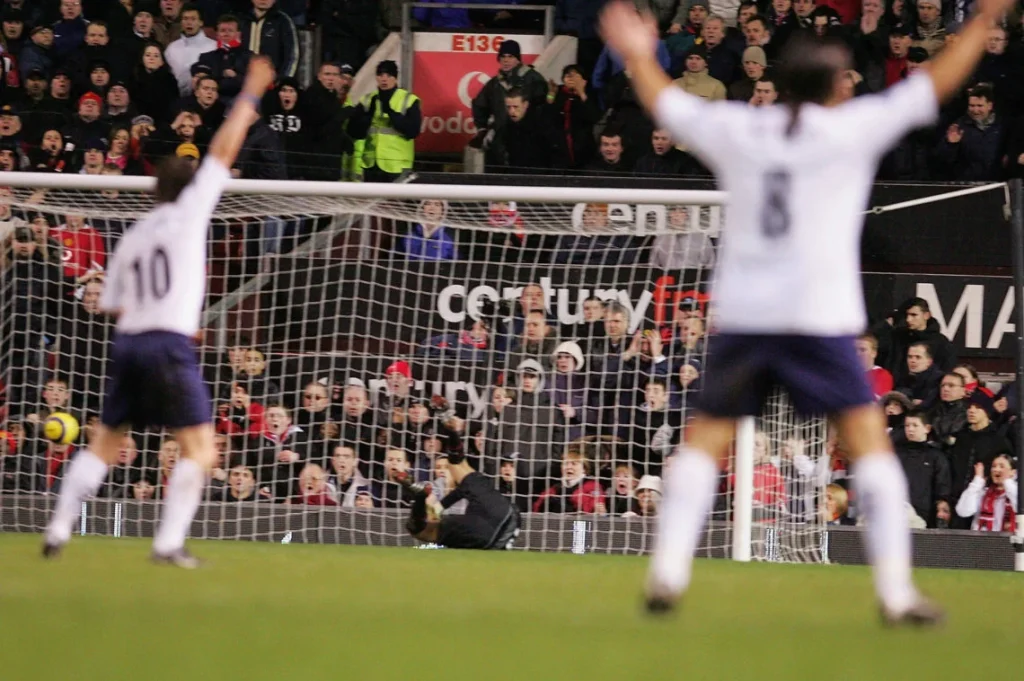Paul Scholes didn’t hold back when asked to recall the worst refereeing decision he’s ever witnessed, and it’s clear that, for him, one moment involving Tottenham Hotspur remains unforgettable.
While controversial calls have always been part of football, the incident he referenced from 2005—when Pedro Mendes’ long-range strike clearly crossed the line against Manchester United at Old Trafford but wasn’t awarded as a goal—still stands as a glaring blemish on the sport’s officiating history.
Scholes, reflecting on that moment, didn’t hesitate to call it the worst decision he’s ever seen in football. The ball had clearly crossed the line by a significant margin, yet neither the referee nor the linesman recognized it, allowing play to continue as if nothing had happened.
Even Gary Neville, who shared the pitch that night, backed up Scholes’s assessment. During their conversation on Stick To Football, the two former United teammates shared a moment of disbelief as they recalled just how far the ball had gone in and how stunning it was that the officials missed it.
Roy Carroll, United’s goalkeeper at the time, had spilled the ball backward into his own net after failing to deal with Mendes’ ambitious shot. Despite the obvious nature of the error, no goal was awarded, and the match ended in controversy.
Sir Alex Ferguson, then United’s manager, acknowledged after the game that the goal should have stood. He used the moment to advocate for the introduction of technology in football, arguing that the game needed to evolve to avoid such catastrophic mistakes.
Still, Ferguson also pointed out that from his angle on the touchline, the incident wasn’t entirely clear. He defended the officials to a degree, noting that the linesman was racing back and may not have had the best view.

Ferguson’s comments also highlighted how such moments are often perceived differently depending on which team benefits from or suffers because of them.
He pointed out that Manchester United had also been on the receiving end of questionable officiating during the match, claiming Rio Ferdinand had been denied a clear penalty. His frustration was less with a single mistake and more with the inconsistency that plagued refereeing decisions at the time.
This wasn’t the only time Tottenham found themselves at the center of VAR or officiating controversies. The 2019 Champions League final remains etched in fans’ memories, not only for the high stakes but also for the contentious early penalty awarded against them.
A handball call following a VAR review handed Liverpool an advantage almost immediately, shaping the entire dynamic of the match. Critics argued that the decision was harsh and altered the course of a final that had been highly anticipated.
More recently, during a Premier League clash with Chelsea, Tottenham were once again the victims of a dubious refereeing moment. Moises Caicedo committed a reckless challenge that many believed warranted a red card, yet VAR didn’t intervene decisively.
These incidents continue to fuel debates over the effectiveness and consistency of video technology in football. While VAR was introduced to eliminate clear and obvious errors, its use has often created just as much controversy as it has resolved.
At the same time, Tottenham have also found themselves on the favorable side of such decisions. A notable example came in 2023, when Luis Diaz had a goal disallowed for offside in a match against Spurs—a call that many deemed incorrect upon review.
This illustrates the double-edged nature of officiating errors and the way luck seems to swing both ways over the course of a season.
Historically, football has seen its fair share of high-profile refereeing blunders. Frank Lampard’s disallowed goal against Germany in the 2010 World Cup is perhaps one of the most famous.
The ball hit the crossbar, bounced well over the line, and came back out, yet the officials waved play on. The decision drew outrage worldwide and played a crucial role in accelerating the adoption of goal-line technology.
Similarly, Luis Garcia’s controversial goal for Liverpool in the 2005 Champions League semi-final against Chelsea remains debated to this day. Whether the ball actually crossed the line has never been conclusively proven, and Chelsea fans still claim the so-called “ghost goal” cost them dearly.
Another example includes Clint Hill’s disallowed goal against Bolton in 2012. The ball crossed the line by a considerable margin, but no goal was given—an error that could have led to QPR’s relegation that season.
Looking even further back, Geoff Hurst’s famous goal in the 1966 World Cup final has also been shrouded in controversy for decades. Many still question whether the ball actually crossed the line before bouncing out.
Today, goal-line technology has all but eliminated these types of mistakes. The instant confirmation provided by the system ensures that such errors no longer dominate headlines or decide critical matches.
While not perfect, this innovation has added a level of fairness that the sport previously lacked. Yet, as Scholes’s story illustrates, the scars from decisions made before technology’s arrival still linger in football’s collective memory.

